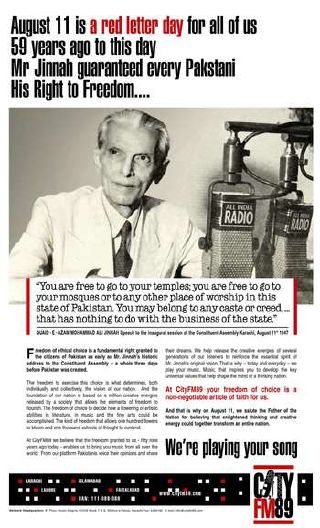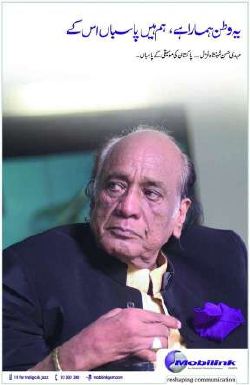Adil Najam
 What an amazingly poignant and powerful advertisement. And how timely.
What an amazingly poignant and powerful advertisement. And how timely.
Published in Dawn (11 August, 2006) as a full page ad for the radio station City FM 89 it highlights what I believe to be one of Mr. Jinnah’s most evocative and inspiring speeches. Certainly one that is most relevant to Pakistan’s present as well as future. The key quote is printed right below his photograph:
“You are free to go to your temples; you are free to go to your mosques or to any other place of worship in this state of Pakistan. You may belong to any caste or creed — that has nothing to do with the business of the state.”
Of course, his vision was not always followed. But on this, the eve of Pakistan’s Independence Day, there could not be a more timely moment to remind ourselves what the vision was.
City FM 89 also has a full day of special music planned for August 14, which by the looks of its sounds very enticing. For example, I would love to find out what their list of the ‘Top 50 Pakistani Songs’ look like. Whatever that list might look like, it is bound to have multiple entries from the incomparable Shahenshah-e-ghazal: Mehdi Hassan.
And that brings me to the second advertisement I saw, also in Dawn (12 August, 2006). This ad also spoke to my sensibilities.

First, this advert from Mobilink pays tribute to one of our greatest artists. That is something we do not do often enough; and do not do very well when we do it.
Moreover, the Urdu verse at the top — yeh watan hamara hai, hum hain pasbaan iss kay — comes from what I think is one of the most moving Pakistani national songs ever (commentary and link to the song here; more ATP posts on this here and here).
Most of song is in the ‘words’ of Mr. Jinnah so that ‘humara‘ (ours) in that line is ‘tumhara‘ (yours) in the song. But the intent is quite clear: we have to make of this country what we make of it. Even as a kid, this song always mesmerized me both for how Mehdi Hassan sang it and even more so for the words…. hum tou mehz unwaaN thay, asl daastaN tum ho!
Unlike so many other milli naghmay which were really naara baazi set to music, this one had a clear and powerful message. It seemed to me that Jinnah was saying to all of us: ‘guys, my time is up, I have done what I could, now its your turn; do the best you can and make the best of what you have.’ Of course, neither he nor the song was saying exactly that. But that is what I took from the song.
It was always a poignant song, but also an uncomfortable song. Because one always knew that we had not really lived up to the responsibility placed on us.




















































I am proud when I thing that I am a Pakistani
I agree with you, that the question of Pakistan
Love your country & don,t forget all the secrifices,who was given by our forefathers.
Someone put a link for this somewhere else, but I wanted to say here also that there was a very nice Editorial in ‘The News’ today about this:
——
The Quaid’s words
The introduction of a bill in the National Assembly proposing the inclusion of Quaid-e-Azam Muhammad Ali Jinnah’s famous speech that he delivered to the Constituent Assembly on August 11, 1941 is a welcome move on the part of the treasury MNA who has moved the bill. The speech is famous and perhaps controversial because of attempts by successive vested interests and shapers of our national ideology and worldview to censor it, especially because it shows the Quaid’s vision of a Pakistan where, in his own words, people would be free to go to their temples, to their mosques or any other place of worship, that they may belong to any religion or caste or creed and that would have “nothing to do with the business of the state”. Clearly, he saw a Pakistan where the state and the government of the day would not intrude into the private lives of citizens and where the latter would be free to practice the faith of their choosing without fear of punishment or prosecution.
Had that great man been alive today he would have been most upset and disappointed. He would have been upset by seeing laws such as the ones dealing with blasphemy, he would have been unhappy at the discriminatory treatment of the minorities, he would have been particularly dismayed by the way we treated our only Nobel Prize winner and how a government by one fell swoop outlawed a whole community. Had Jinnah been alive today, the high level of hypocrisy and pervasive misuse of religion would not have been escaped him either — and if anything he would have probably found it revolting. For instance, how does any government explain giving students of a particular faith extra marks for memorising their Holy Book while not allowing the same option to those of other faiths. Of course, one is referring here to the provision – which began with General Zia’s dark rule — where students who applied to government-owned colleges were given extra marks if they had learnt the Holy Quran by heart. This is discriminatory because a similar concession is not granted to non-Muslim applicants.
The fact is that the incorporation of Jinnah’s speech into the Constitution, as envisaged by the MNA who has moved the bill, is not so important as is its implementation in letter and spirit. Sixty years after this country’s birth, there is still controversy over what the country should be and what the Quaid wanted it to be. One thing is clear enough: if one reads his speeches, this one in particular, then it becomes clear as crystal that he did not want Pakistan to become a theocratic state. That probably helps explain why the religious parties and the clergy were all opposed to him and his efforts to create Pakistan.
In any case, there are several constitutional provisions, not least Article 25, which guarantee all citizens equality before the law and the right to equal protection. Much of what this article and several others are guaranteeing relate to what Jinnah said in his Aug 11 speech but there are openly ignored or violated. Even if the bill does not get passed, the government should do its bit to at least make available to citizens their constitutional rights.
Did ppl see the great news today. Motion in assembly approved to include passage from this speech within the constitution. I think it is great.
[…] Mohamed Ali Jinnah, it seems, was not a “real freedom fighter” and he did “nothing for Islam.” (On Jinnah, see here, here, here, here, here, here, here, and here). So says the Jamiat Ulema-e-Islam (JUI). And by what logic does Maulana Fazlur Rehman and his party come to this conclusion? According to the party spokesman: ““Jinnah was not imprisoned during the independence struggle. That is why he did nothing worth remembering.â€